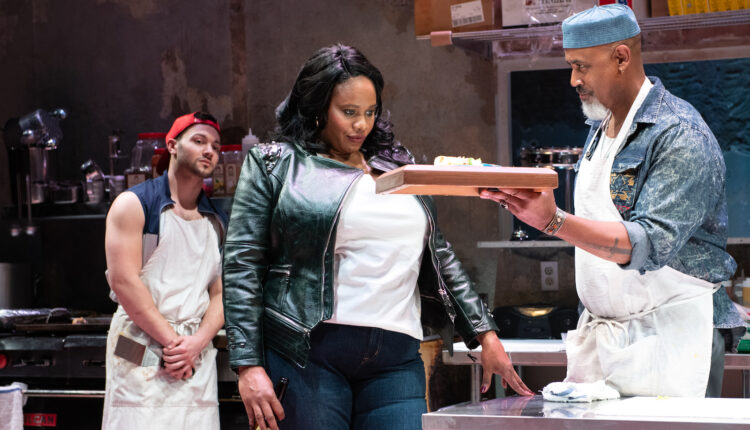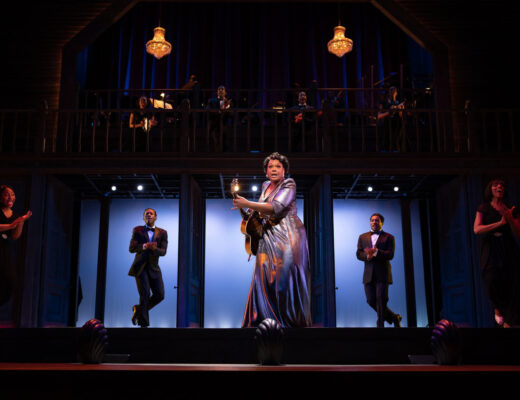By Imani Nyame
This article was originally published in The DC Line here.
Toting a bottle of beer, Clyde (Dee Dee Batteast) comes on stage clad in a busty denim dress, a synthetic wig from the local beauty supply and a little too much blush. With gusto that can only be earned from a hard-knock life, she comes to be the owner of a beat-up truck stop sandwich shop, home to a staff of formerly incarcerated men and women who have nowhere else to go. When veteran employee Montrellous (Lamont Thompson), connoisseur of sandwiches and second chances, urges her to try something new to expand the business, she is pessimistic and immovable. He coaxes, telling her to remember her mother’s cooking, to which she responds: “My mother never cooked anything. … That woman was like peanut brittle, sweet and salty, and I was never sure whether I actually liked her.”
The same can be said for the current Studio Theatre production of Clyde’s, written by Pulitzer Prize-winning playwright Lynn Nottage and directed by Candis C. Jones. Notwithstanding the effectiveness of the script’s message and humor, I left the theater thinking that some parts lacked intention — a weakness exacerbated by uneven pacing as the result of direction that plays it safe. We witness a story stenciled in from the proverbial “when life gives you lemons” complex — but in this case it’s “when life gives you a criminal record, a ‘licensed dominatrix’ as an employer and a random box of swiss chard … get creative and make a sandwich.”
With shabby concrete walls and red-and-once-white checkered tile flooring, Clyde’s kitchen, designed by Junghyun Georgia Lee, is a universally familiar hole in the wall where you can expect good grub aside from the occasional stomach ache. (The audience might as well be in the kitchen, transported by aromas, like chocolate in a climatic scene, pumped through the vents of the theater by sensory consultant Miriam Songster.) Questionable health and safety practices — such as wiping knives on the backs of dingy aprons or spraying disinfectant spray over an open container of fresh tomatoes — scream that Clyde’s is far from any Michelin recommendation.
The staff of ex-convicts includes Letitia (Kashayna Johnson), a stylish young Black mom of a daughter with a rare genetic condition; Rafael (Brandon Ocasio), a classic example of Latin machismo; and Jason (Quinn M. Johnson), a reserved yet temperamental white male. Individually these characters are dynamic, but as an ensemble they fall flat. The caricatures, though written with an indelible urgency, need perhaps a bit more spontaneity from a cast that takes things a bit too seriously. Parts that are meant to be funny don’t always land, and parts made out to be serious don’t quite fit. Adequately entertained but not truly invested, I found myself wanting to find out more about who these people are and what led them all to Clyde’s.
Nottage’s use of food as an agent of freedom brings her spunky, gritty script to life. It’s lighthearted and deep in perfect balance. The fatherly Montrellous provides a counterpoint to an imperious Clyde. Smooth and somewhat of a martyr, he is the glue that holds the spirit of the place intact. In platitudinous fashion, he encourages his co-workers to use the art of crafting a perfect sandwich as an extension of their realities. Mastering their ability to create perfect harmony with the ingredients at their disposal is how they will take control of their lives. (Are we still talking about sandwiches?)
Clyde is not impressed, however. She dominates the place with a steel presence, intimidating her employees and belittling them with invasive insults. She knows they have nowhere else to go and revels in the fact. I was thrilled at the chance to witness a truly malicious female villain even if in the realm of an unappealing sandwich shop.
But something about Batteast’s Clyde feels unsure, her prowess not quite earned. Perhaps it is that the tackily flashy costumes, designed by Danielle Preston, don’t hit quite the right note. Instead of showcasing a businesswoman who apparently has a little extra money to spend on behalf of a gambling problem, her clothes look cheap and ill-fitting. That’s a shame because — irrespective of Clyde’s discourteous disposition — something tells me she is a woman of immense style, a trait that could only bolster her confidence. Batteast’s Clyde is instigative, choosing to knock things over or out of her staff’s hands as punctuation to her outrageous rants, bringing to mind a high school bully who craves attention. Maybe it’s just me, but it’s hard to believe that a room full of people convicted of brazen crimes would stand for this.
Despite such shortcomings, this production holds together well enough to keep the audience involved, if not convinced. Crafty transitions detail the fast-paced environment of a busy restaurant — the ring of madam Clyde’s call bell signifying there is yet another sandwich to be made. There is an undeniable charm to Clyde’s. If you are willing to take the ingredients this production provides and to experience the show for what it is, you too can improvise a refreshing glass of lemonade … or a satisfying sandwich.





No Comments